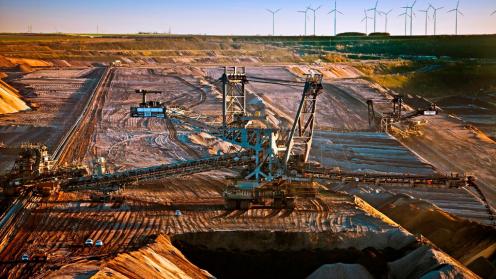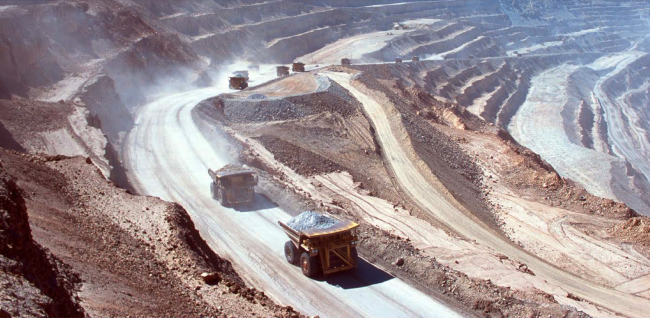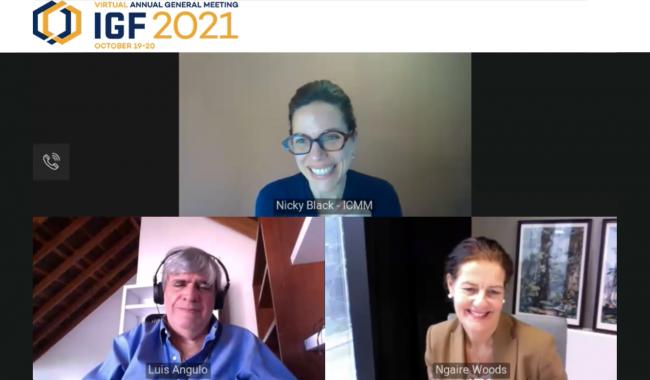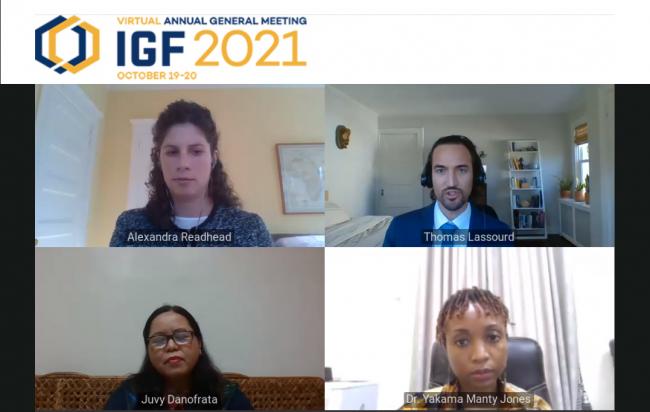The 17th Annual General Meeting (AGM) of the Intergovernmental Forum on Mining, Minerals, Metals and Sustainable Development (IGF) opened on Tuesday, 19 October, with a focus on the future of mining and how the sector can contribute to sustainable development and the global energy transition. Among other things, Tuesday saw the launch of the IGF’s Mining Environmental and Social Impact Assessment (ESIA) Tool, which aims to help governments identify gaps in their legal and institutional capacity for ESIA.
Opening the meeting, Greg Radford, Director, IGF Secretariat, underlined that the transition to a low-carbon economy will require a significant amount of minerals and metals, and said this AGM aims to balance addressing today’s challenges with the need to promote dialogue on how to build a better future together. Isabelle Ramdoo, Deputy Director, IGF Secretariat, said this AGM will feature a diverse set of perspectives on how governments, mining companies and their partners have navigated through the COVID-19 crisis, and discuss what actions they have collectively taken to achieve a more responsible and inclusive future.
Ibrahima Guèye, Secretary General, Ministry of Mines and Geology, Senegal, said the AGM’s reflections on the technologies of the future will influence countries’ priorities and require even more collaboration between governments and the private sector. Jean-François Tremblay, Deputy Minister of Natural Resources, Canada, underlined that the ability to find, extract, process and bring to market the critical minerals and materials needed to build future technology and innovation, is central to efforts to build a sustainable, inclusive and prosperous future in the post COVID-19 recovery.
Following opening remarks, participants gathered in a series of parallel sessions exploring a range of topics. A session on artisanal and small-scale mining (ASM) focused principally on reclamation challenges and solutions, with examples provided from the Asia Foundation’s project in Mongolia and Gem Fair's project in Sierra Leone. The Global Environment Facility (GEF) Small Grants Programme (SGP) explained its role in the UN Decade on Ecosystem Restoration and ASM, and efforts to test alternatives to mercury use in gold ASM in 10 countries. Participants discussed the importance of a human rights approach that involves rather than demonizes small-scale miners, uses local labor and inputs, and provides livelihoods for the local community.
On “new thinking, different skills and unusual collaborations for the future,” speakers explored what a better tomorrow will look like for the mining sector, identifying a mining sector where:
- companies’ objectives align with the objectives and aspirations of host territories and peoples;
- the materials and minerals crucial for humanity to achieve the necessary energy transition are responsibly and inclusively produced; and
- host communities benefit rather than suffer.
Ngaire Woods, Oxford University, said the mining sector must work in partnership with: local communities; their own employees; other sectors such as researchers and civil society; and governments.
The session on “Building gender equality in the mine of the future,” discussed the IGF’s “Women and the Mine of the Future” project which aims to, among other things, close the gap on availability of granular disaggregated data on participation of women in mining. Barbara Dischinger, Director, International Women in Mining, said more data on women in mining is essential to understand where we are today, measure progress and see where we want to head.
The session on tax incentives discussed the country experiences of Sierra Leone and the Philippines, as well as the implications of the recent global accord on tax reform for mining tax incentives. Panelists agreed that most tax incentives are distorting and rarely attract economic benefits commensurate with their cost. Speakers suggested that if granted at all, incentives should be time-bound, performance-linked, transparent and balanced against their costs. They said the impact of the global tax reform will depend on the details of how it is operationalized, but warned it might spark competition in tax types not covered by the agreement.
The session on national dialogues heard the specific experiences of Ghana and Tanzania, as well as lessons learned from national dialogues conducted in Latin America with support from the Inter-American Development Bank. Panelists generally agreed that successful dialogues require, inter alia:
- full commitment by the convening party at top level, usually a national government;
- common, evidence-based information to start;
- effective representation by all interested parties, sometimes requiring capacity building for some stakeholders;
- a participant-driven agenda;
- well-defined rules of the process;
- taking time to create trust among stakeholders; and
- an early focus on finding "low-hanging fruit" - practical, scalable solutions.
The final session of the day saw the official launch of the IGF’s Mining ESIA Tool (MET). The Tool was developed to analyze countries’ environmental and social legal frameworks and practices in relation to the mining industry, and complements the IGF’s Guidance for Governments on improving legal frameworks for ESIA and management. Participants also heard presentations on the ESY-MAP diagnostic tool for assessing the quality of national ESIA systems, which was developed jointly by the Netherlands Commission for Environmental Assessment and Southern African Institute for Environmental Assessment, and formed the basis of the IGF’s Tool.
To receive free coverage of global environmental events delivered to your inbox, subscribe to the ENB Update newsletter.












